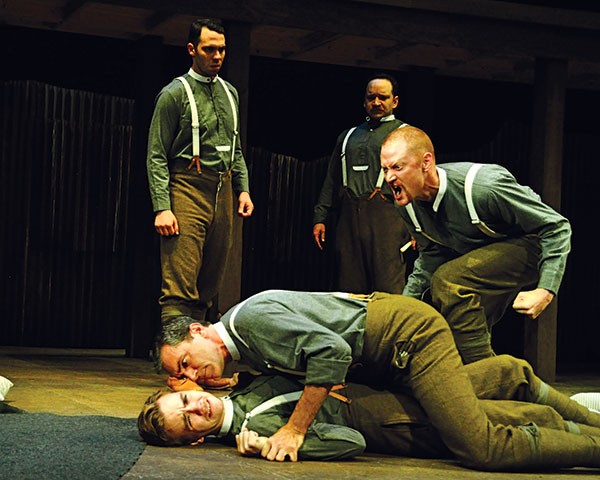
At PICT Classical Theatre's production of Frank McGuinness' Observe the Sons of Ulster Marching Towards the Somme, you need to just let it wash over you. This mountain of a play doesn't easily, if ever, reveal its secrets ... and if you don't try looking for them, there are considerable pleasures to be had.
In the present day, we meet a delusional Irish man haunted by his memories of having served in the First World War with a division of Ulster Protestants. Through the magic of theater, we then travel back in time and join the soldiers on their first day. We later see them back home, on leave. And in the final scene, they're preparing for the Battle of the Somme.
As demonstrated in his most popular play, Someone to Watch Over Me, McGuinness is capable of creating powerful set-ups and filling out his plot with thrilling dialogue. PICT director Matt Torney will never be accused of underplaying any emotional beat: In his hands, this play is its own sort of siege. There isn't a second you're not giving the production the attention demanded.
And that intensity is matched by a first-rate cast. Martin Giles, Jason McCune, Ciaran Bryne, Byron Anthony, Justin R.G. Holcolmb, Dylan Marquis Meyers, Jonathan Visser and Tony Bingham, led by an impeccable Raife Baker, pull out all the stops.
But I'm not sure I could say the evening is unabated theatrical joy. There is the matter of cultural specificity: Observe the Sons, which premiered in 1985, is a terrifically Irish play, and deep knowledge of the Great War and "The Troubles" is required for some of the emotional beats to land.
McGuinness' own talent ends up being problematic as well. The man is drunk on language, and after a while the characters all begin to sound alike; Belfast shipbuilders speak with the same studied cadences and linguistic palettes as Oxbridge graduates. Eventually the story and people give way to a highly literate meditation on God, life and death. Not an actual play, perhaps, but if you allow McGuinness and his words to weave a spell, you're sure to be captivated.

